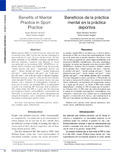| dc.creator | Montero Herrera, Bryan | |
| dc.creator | Carazo Vargas, Pedro | |
| dc.date.accessioned | 2022-03-22T14:38:48Z | |
| dc.date.available | 2022-03-22T14:38:48Z | |
| dc.date.issued | 2019 | |
| dc.identifier.citation | https://revista-apunts.com/beneficios-de-la-practica-mental-en-la-practica-deportiva/ | es_ES |
| dc.identifier.issn | 2014-0983 | |
| dc.identifier.uri | https://hdl.handle.net/10669/86254 | |
| dc.description.abstract | La práctica mental (PM) es un medio que, si bien se inició a desarrollar en 1890, no es hasta hace aproximadamente 22 años que se ha usado más en práctica deportiva. Para llevar a cabo esta revisión se siguieron las cuatro etapas identificadas en la declaración PRISMA (identificación, selección, elegibilidad, inclusión). Se realizó una búsqueda en las bases de datos ERIC, SPORTDiscus, Academic Search Complete y PubMed, utilizando las palabras clave “mental practice and sport”, “kinesthetic practice and sport”, “mental training and sport”, “mental preparation and sport”, “motor imagery and sport”, “visual practice and sport”, y estas mismas palabras clave en español. Con estas búsquedas se obtuvo un total de 11 390 artículos, de los cuales se incluyeron 59 estudios. Los criterios de exclusión fueron: poblaciones con diagnóstico de esquizofrenia, demencia o algún tipo de cáncer, no incluir la PM como variable independiente y combinar la PM con algún tipo de incentivo. La evidencia sitúa a la PM como una buena herramienta para la mejora de la ansiedad precompetitiva, autoconfianza, concentración y motivación, sirve también para la rehabilitación deportiva, el desarrollo de la fuerza y una combinación de la PM con el movimiento real alcanza resultados más positivos. | es_ES |
| dc.description.abstract | Mental practice (MP) is a form of exercise which has been in existence since 1890, but has only become widespread in sport in the last 22 years. To carry out this review, the four stages identified in the PRISMA statement (identification, selection, eligibility, inclusion) were followed. A search was performed on the databases ERIC, SPORTDiscus, Academic Search Complete and PubMed using the keywords “mental practice and sport”, “kinaesthetic practice and sport”, “mental training and sport”, “mental preparation and sport”, “motor imagery and sport” and “visual practice and sport”, and same keywords in Spanish language. With these searches, a total of 11 390 articles were obtained, which included 59 studies. The exclusion criteria were populations with a diagnosis of schizophrenia, dementia or some type of cancer; not including MP as an independent variable; and combining MP with some kind of incentive. The results found that MP is a good tool for improving pre-competitive anxiety, self-confidence, concentration and motivation. It can also be used for sports rehabilitation and strength development, and a combination of MP and real movements to attain more positive results. | es_ES |
| dc.language.iso | spa | es_ES |
| dc.source | Apunts Educación Física y Deportes, núm 135, pp.82-99. | es_ES |
| dc.subject | Práctica visual | es_ES |
| dc.subject | Práctica kinestésica | es_ES |
| dc.subject | MOTIVACIÓN | es_ES |
| dc.subject | Fuerza | es_ES |
| dc.subject | Rehabilitación deportiva | es_ES |
| dc.subject | Visual practice | es_ES |
| dc.subject | Kinaesthetic practice | es_ES |
| dc.subject | MOTIVATION | es_ES |
| dc.subject | Strength | es_ES |
| dc.subject | Sports rehabilitation | es_ES |
| dc.title | Beneficios de la práctica mental en la práctica deportiva | es_ES |
| dc.title.alternative | Benefits of mental practice in sport practice | es_ES |
| dc.type | artículo original | es_ES |
| dc.identifier.doi | 10.5672/apunts.2014-0983.es.(2019/1).135.06 | |
| dc.description.procedence | UCR::Vicerrectoría de Docencia::Ciencias Sociales::Facultad de Educación::Escuela de Educación Física | es_ES |


